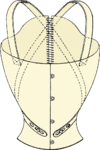Training corset

A training corset is generally a corset used in body modification. A training corset may be used for orthopedic reasons (such as to correct a crooked spine) or for cosmetic reasons (to achieve a smaller waistline, commonly called waist training or in more extreme cases tightlacing.)
The term "training corset" is also sometimes used for BDSM corsets used for discipline.
In addition, the term "training corset" may simply refer to a corset which is used to acclimate the body prior to wearing a full corset as an everyday undergarment, or to any corset worn by somebody undertaking training (achieving a desired body shape).
Redresseur corset
The redresseur corset was a form of training corset used from the mid-19th century into the early 20th century, designed specifically for young adolescent girls who had not worn stays from an early stage.[1] In addition to moulding a pronounced waist, it served as a back harness and was intended to improve posture.[2]
Orthopedic corsets
Corsets may be worn for orthopedic reasons, such as correcting a crooked spine or straightening the back and shoulders.
Waist training corsets
Waist training, or waist reduction, generally uses an hourglass corset. Waist reduction, sometimes called "tightlacing," is often used by women who are post-pregnancy or by women involved in BDSM.
No structural features distinguish a modern waist training corset from a corset worn as an external garment for special occasions. Training corsets are always made from strong fabric (or leather) and with relatively inflexible boning (not all corsets are strong enough to mold a body). A training corset is designed to be used every day, and will generally be hidden under clothing, so it is likely that the practical aspects (comfort, ease of laundering, etc.) will have been prioritized in its construction over aesthetic ones.
Any style of corset can be used for waist training, although some styles are more popular and suitable than others. However, as the corsets necessary to maintain a body modification are no less rigid than those first worn to achieve the modification, there is no effective structural difference between corsets worn during training and those worn once the desired body shape is achieved. The term "training corset" can therefore be used for any corset worn by somebody undertaking training.
Bondage and discipline corsets
A training corset is also an alternative name for a discipline corset or bondage corset. A bondage corset is used as a tool for punishment. It is constructed to place severe limitations on the wearer's movements. A bondage corset generally extends to just above the knees, and is constructed to be laced very tightly. These corsets are often designed to be worn for long periods of time, e.g. overnight and during sleep.
Preparatory corsets
During earlier times in western countries a corset was an everyday item of apparel. In some periods, children were put in stays as soon as they could sit upright or walk. It was believed that the young body was too soft to grow upright on its own. Boys stopped wearing them once they were breeched (began to wear adult clothing) at about 4-7. Girls continued to wear them for their whole lives. It was not until the late 19th century that this practice began to fall away.
It was primarily in the 19th century when corsets were used to noticeably reduce a woman's waist in order to achieve a fashionable hourglass figure. The corset was laced progressively tighter, forcing the floating ribs upward and compressing the soft tissue at the waist. This could lead to many negative health ramifications, including difficulty breathing, problems with digestion, and permanent deformity.
The actual prevalence of this practice is difficult to ascertain. It was most likely practiced by only a small portion of the corset-wearing population.
See also
External links
- ↑ Watt, Gary (2013). Dress, Law and Naked Truth: A Cultural Study of Fashion and Form. London: Berg. p. 115. ISBN 9781472500434.
- ↑ Summers, Leigh (2001). Bound to please : a history of the Victorian corset (Reprinted. ed.). Oxford [u.a.]: Berg. p. 81. ISBN 9781859735107.